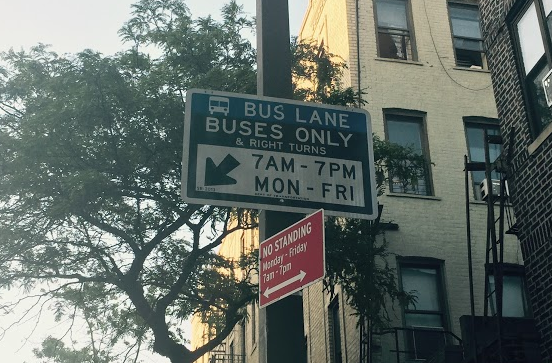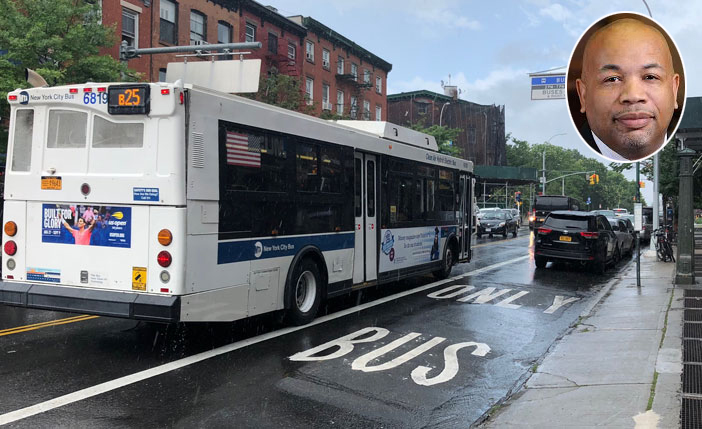What does the Assembly have against the bus?
A bill to speed up city buses through the expanded use of bus-mounted and on-street enforcement cameras — which would also allow such cameras in bike lanes — has run up against opposition from the state Assembly, Streetsblog has learned.
The proposal, which made it into the proposed budgets of both Gov. Hochul and the state Senate, would allow officials to expand the city's bus lane camera enforcement — currently limited to bus-only lanes and streets — to bus stops and other bus-only areas. Under the expanded program, cameras would ding drivers who park in bus stops, no stopping zones, no standing zones, and bike lanes, in addition to bus lane and busway violators.
Camera enforcement has been a boon for riders since its introduction in 2019, according to MTA stats. Routes like the Q44-SBS and BX12 moved nine and six percent faster, respectively, after cameras began spitting out tickets on those routes last year, officials said.
Assembly Democrats, however, have so far declined to expand the program, despite its strong backing from transit leadership. Speaker Carl Heastie (D-Bronx) and his caucus joined state Senate leaders last year to block a Hochul proposal to raise camera fines for blocking bus lanes.
A rep for Heastie on Thursday insisted Assembly member prefer to keep "policy" out of the budget process — the same reason cited in rejecting Hochul's 2022 proposal. "We generally did not include policy in our proposal," the spokesman, Mike Whyland, said.
Hochul's proposal would not change the fines for bus obstructors caught on camera. A ticket for impeding bus operations would be $50 — plus $50 for each subsequent ticket in a 12-month period, capped $250 for a fifth ticket in that timeframe. Drivers seem to get the message after the first ticket — 80 percent of people who get a camera ticket for blocking a bus don't get a second one, and under 8 percent of drivers get a third ticket, according to city stats.

The enforcement expansion still has a shot of passing this year as part of legislators' "Fix the MTA" package, which among other things proposes making buses free in part to save time currently spent collecting fares.
The MTA currently has 423 bus-mounted cameras in use on 16 routes, and will have 1,000 in use by the end of 2023, officials said on Thursday. The cameras have proven an invaluable a tool to get bus riders where they need to go, New York City Transit President Rich Davey told Streetsblog.
"In our customer satisfaction reports, for people getting people around on the bus ... it's about wait times and speeds," Davey said. "By expanding enforcement to include double parked cars, as an example, we think this can be another game changer for our customers."
A coalition of transit groups recently urged state legislative leaders, including Heastie, to back the proposal expansion — arguing that fighting climate change requires luring more New Yorkers onto the bus with better service.
"When bus lanes are blocked, buses either have to idle while waiting for an occupied vehicle to move, or they have to maneuver into traffic and back into the bus lane, adding additional miles traveled and additional emissions," the groups wrote in their March 1 letter.
"When our buses work better people will be more likely to use them, reducing reliance on private vehicles and the associated emissions."
Advocates said the Assembly is making "lame" excuses that will saddle city bus riders with slow service.
"Bus riders' time is money," said Riders Alliance Director of Policy and Communication Danny Pearlstein.
"If the state budget ignores the financial impact of slow buses on riders and our families because of a lame excuse from the Assembly, then the people's house will have failed actual people and our actual houses."






